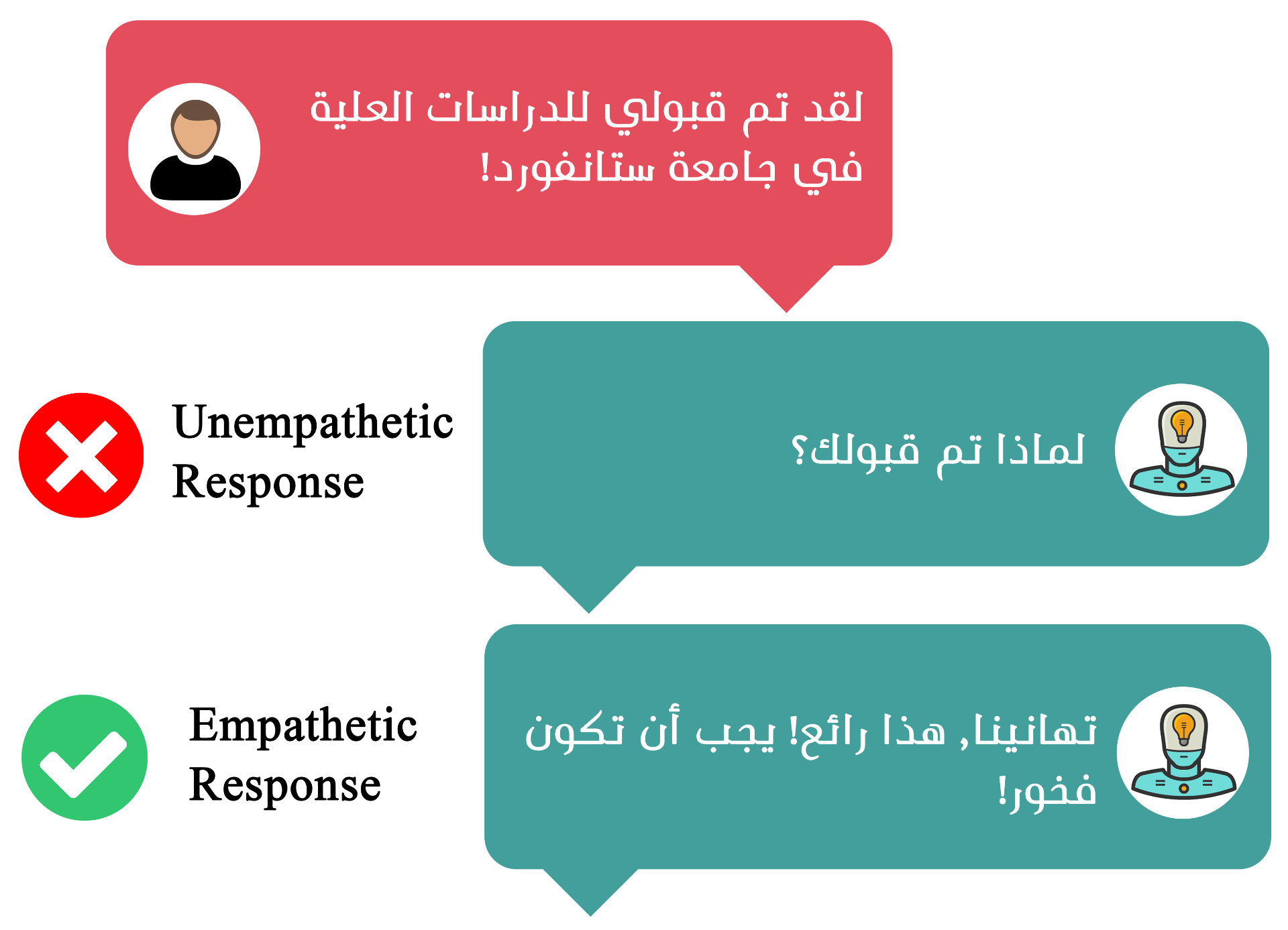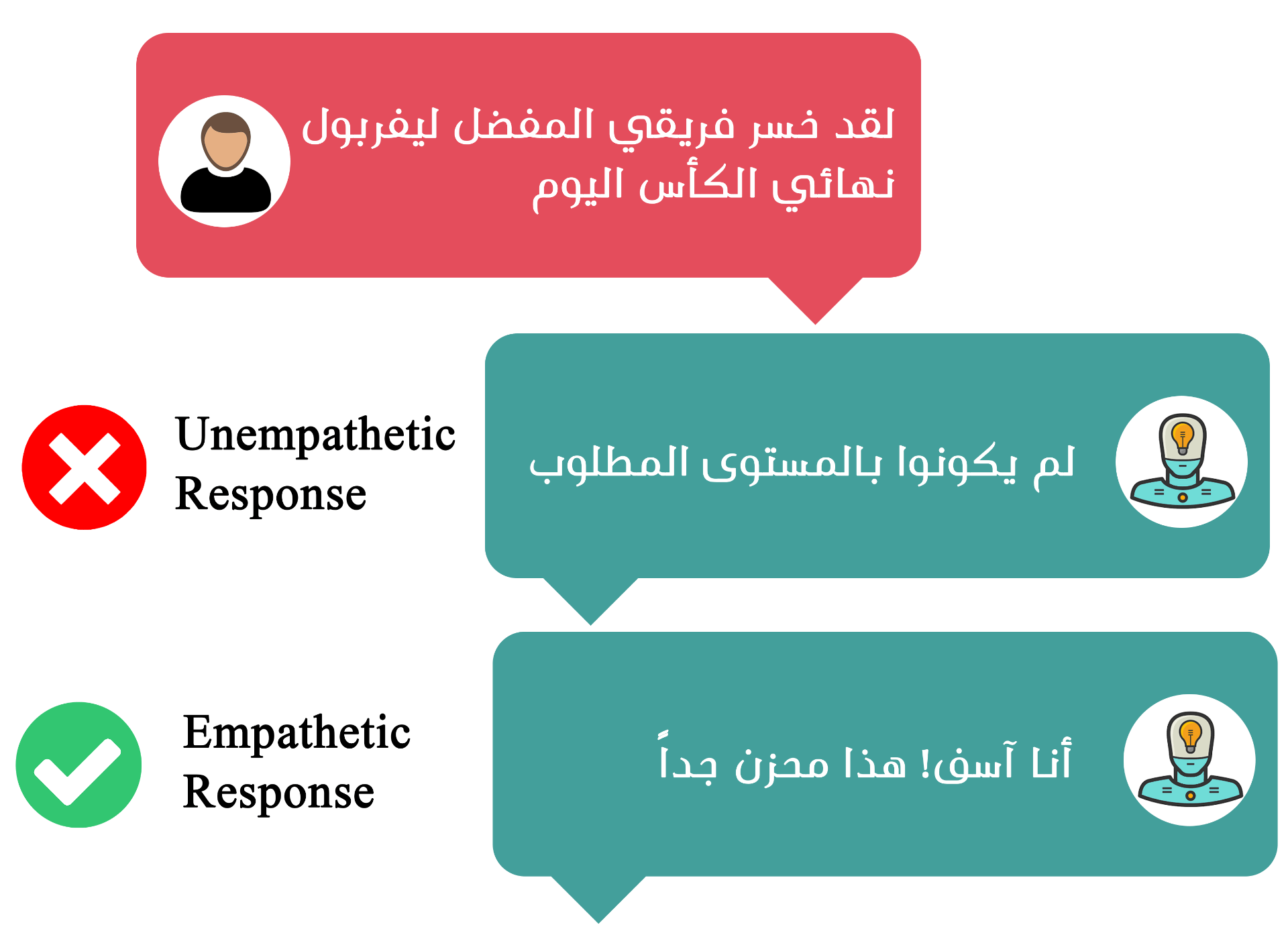We are excited to share a preview of the paper titled “Empathy-driven Arabic Conversational Chatbot” by Tarek Naous, Christian Hokayem, and Prof. Hazem Hajj. The paper will be published at WANLP 2020 at COLING’2020, Barcelona, Spain, 12 Dec. 2020.
Abstract: Conversational models have witnessed a significant research interest in the last few years with the advancements in sequence generation models. A challenging aspect in developing human-like conversational models is enabling the sense of empathy in bots, making them infer emotions with the person they are interacting with. By learning to develop empathy, chatbot models are able to provide human-like, empathetic responses, thus making the human-machine interaction close to human-human interaction. Recent advances in English use complex encoder-decoder language models that require large amounts of empathetic conversational data. However, research has not produced empathetic bots for Arabic. Furthermore, there is a lack of Arabic conversational data labeled with empathy. To address these challenges, we create an Arabic conversational dataset that comprises empathetic responses. However, the dataset is not large enough to develop very complex encoder-decoder models. To address the limitation of data scale, we propose a special encoder-decoder composed of a Long Short-Term Memory (LSTM) Sequence-to-Sequence(Seq2Seq) with Attention. The experiments showed the success of our proposed empathetic-driven Arabic chatbot in generating empathetic responses with a perplexity of 38.6, an empathy score of 3.7, and a fluency score of 3.92.



Hey there, You’ve done a fantastic job. I’ll certainly digg it and personally recommend to my friends. cerita77
I am sure they’ll be benefited from this site. cerita77
sdafc
Thank you so much as you have been willing to share information with us. We will forever admire all you have done here because you have made my work as easy as ABC. slot dana
Title: The Chemical Composition and Applications of ADB-PINACA: A Comprehensive Review
Introduction
ADB-PINACA (Analogue of 1-pentyl-3-(methylsulfonyl)indole-7-carboxylate) is a synthetic cannabinoid that has gained significant attention in recent years due to its emergence in the recreational drug market. This compound is a potent agonist of the cannabinoid receptor type 1 (CB1) and has been linked to numerous cases of intoxication and adverse health effects. Despite the growing body of evidence on the harmful effects of ADB-PINACA, there is a paucity of information on its chemical composition and potential applications. Therefore, this review aims to provide a comprehensive overview of the chemical structure, synthesis, metabolism, and potential applications of ADB-PINACA.
https://bbgate.com/media/adb-pinaca-synthesis.93/
Chemical Structure and Synthesis
ADB-PINACA is a synthetic cannabinoid that belongs to the class of indole-3-carboxylates. Its chemical structure consists of a pentyl chain attached to a sulfonyl group, which is linked to a indole ring substituted with a carboxylate group. The presence of the sulfonyl group and the carboxylate group in the indole ring differentiates ADB-PINACA from other synthetic cannabinoids, such as JWH-018 and AM-2201.
The synthesis of ADB-PINACA involves several steps, including the preparation of the indole ring, the introduction of the sulfonyl group, and the attachment of the pentyl chain. The synthesis process requires specialized knowledge and equipment, and it is typically carried out in clandestine laboratories or by unregulated chemical companies. The final product is a white or off-white powder that is highly lipophilic and can be easily impregnated onto plant material or dissolved in a solvent for use as a recreational drug.
Metabolism and Pharmacokinetics
The metabolism of ADB-PINACA is not well understood, and there is limited information on its pharmacokinetics. However, it is known that ADB-PINACA undergoes extensive metabolism in the liver, primarily by cytochrome P450 enzymes. The major metabolites of ADB-PINACA include carboxylic acid derivatives, sulfates, and glucuronides, which are excreted in the urine and feces.
The pharmacokinetics of ADB-PINACA is also not well understood, but it is believed to have a rapid onset of action and a short duration of effects. The half-life of ADB-PINACA is estimated to be around 1-2 hours, but this may vary depending on the route of administration and the dose.
Potential Applications
Despite the negative attention surrounding ADB-PINACA, there is potential for its use in medical and research applications. Its high affinity for the CB1 receptor makes it a promising candidate for the development of novel therapeutic agents for the treatment of pain, inflammation, and other conditions. However, further research is needed to fully understand its pharmacological properties and safety profile before it can be considered for clinical use.
Conclusion
In conclusion, ADB-PINACA is a synthetic cannabinoid with a unique chemical structure and pharmacological profile. Its potent activity at the CB1 receptor makes it a potential candidate for the development of novel therapeutic agents, but its abuse potential and adverse health effects cannot be ignored. Further research is needed to fully understand the chemical composition, metabolism, and potential applications of ADB-PINACA, and to inform regulatory policies and public health interventions.
Your post has those facts which are not accessible from anywhere else. BRIDALVENUS WEDDING DRESS It’s my humble request to u please keep writing such remarkable articles
Outstanding post once again. I am looking forward to more updates.온라인바둑이
You have a genuine capacity to compose a substance that is useful for us. 카지노사이트 추천
Thanks for such a good articles it really helped me after reading your posts. 섯다
Thanks for sharing your article It is very useful us and amazing blog for the users who want to learn. 스포츠토토
I got know your article’s content and your article skill both are always good. 성인웹툰
Very interesting, wish to see much more like this. 안전 슬롯사이트
I have been searching for such an informative post since many days and it seems my search just ended here. 토토사이트 순위
I am a fan of reading to add insight to information. 메이저사이트
I am happy every time I read many articles. I don’t know how many things And your article is truly one of my favorites. โปรโมทชั่น bet game
Your article has opened my eyes to new possibilities and perspectives. kiếm tiến online
So good to discover somebody with a few unique thoughts on this subject matter.온라인바둑이
We are really grateful for your blog post. You will find a lot of approaches after visiting your post. Great work Zonnepanelen
Glad to chat your blog, I seem to be forward to more reliable articles and I think we all wish to thank so many good articles, blog to share with us. Zonnepanelen installateur
it’s really cool blog. Linking is very useful thing.you have really helped Polypropyleen zwembad
so happy to find good place to many here in the post, the writing is just great, thanks for the post. Zonnepanelen Leuven
Thanks for sharing this information. I really like your blog post very much. You have really shared a informative and interesting blog post . Buitenzwembad
I have recently started a blog, the info you provide on this site has helped me greatly. Thanks for all of your time & work Zonnepanelen Antwerpen
It is the intent to provide valuable information and best practices, including an understanding of the regulatory process. Monoblock zwembad
i am for the first time here. I found this board and I in finding It truly helpful & it helped me out a lot. I hope to present something back and help others such as you helped me. Airco
I am really enjoying reading your well written articles. It looks like you spend a lot of effort and time on your blog. I have bookmarked it and I am looking forward to reading new articles. Keep up the good work. Zonnepanelen Limburg
It is extremely nice to see the greatest details presented in an easy and understanding manner. Zwembadbouw
Wonderful blog post. This is absolute magic from you! I have never seen a more wonderful post than this one. You’ve really made my day today with this. I hope you keep this up! Airco
I was very pleased to find this site.I wanted to thank you for this great read!! I definitely enjoying every little bit of it and I have you bookmarked to check out new stuff you post. Zonnepanelen Hasselt
I really appreciate this wonderful post that you have provided for us. I assure this would be beneficial for most of the people. Zwembad bouwen
My friend mentioned to me your blog, so I thought I’d read it for myself. Very interesting insights, will be back for more! Zonnepanelen Hasselt
Looking for the best 카지노 sites in 2024? Discover the top 카지노 sites recommended by TIRASADMIN. Try your luck with the best online 카지노 games and bonuses
“플레이어 리뷰로 보는 2024년 베스트 카지노사이트”
“2024년 모바일 카지노사이트 가이드”
“2024년 카지노사이트 추천: 최상의 사용자 경험”
visit here tirasadmin.org
This is a great idea, it will definitely be shared widely, thanks for sharing it with us
ติดต่อสอบถาม
Thank you for contributing to the body of knowledge in [field or industry]. kiemtienonline
I like reading posts Thank you for allowing me to comment
ทางเข้าหวยเกาหลี
Amazing! This is a great evolution of bots. A student of mine told me about this during his online class help and I was amazed! This will be really helpful for non arabs as well.
Keep sharing such informative post keep suggesting such post.Review my web page ติดต่อหวยลาว